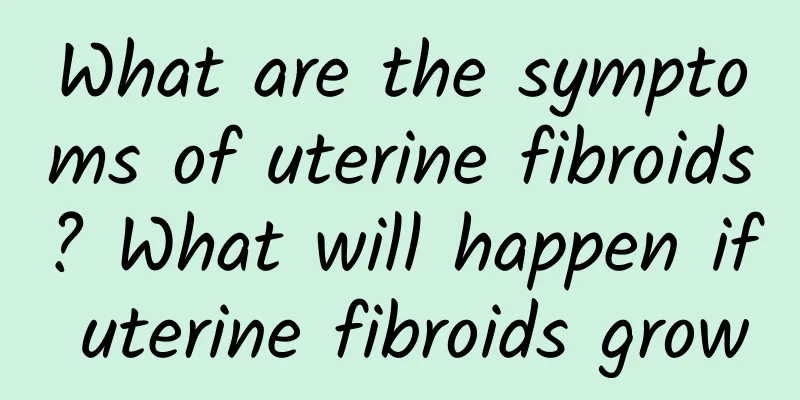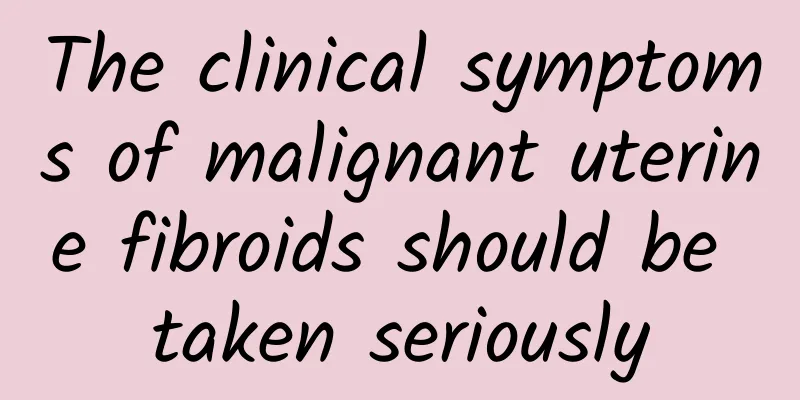What are the symptoms of uterine fibroids? What will happen if uterine fibroids grow

|
What are the symptoms of uterine fibroids? What will happen if uterine fibroids grow? Uterine fibroids refer to benign tumors that occur in the muscle layer of the inner wall of the female uterus. They are one of the common gynecological diseases. With the change of lifestyle and the increase of environmental pollution, the incidence of uterine fibroids has gradually increased. Let us understand the symptoms of uterine fibroids and the possible impacts. 1. Lower abdominal pain and discomfort. The growth of uterine fibroids can put pressure on surrounding tissues, causing lower abdominal pain and discomfort. This pain may vary depending on the size and location of the fibroids, sometimes aggravating or relieving. 2. Menstrual abnormalities. Uterine fibroids may cause irregular menstruation, increased bleeding, and prolonged menstruation. In some cases, uterine fibroids may even cause anemia, making the patient feel tired and weak. 3. Frequent urination and urgency. When uterine fibroids grow to a certain size, they may put pressure on the bladder, causing patients to have symptoms of frequent urination and urgency. This will have a certain impact on the patient's quality of life. 4. Infertility. For some women who want to get pregnant, uterine fibroids may become an obstacle. Due to the presence of uterine fibroids, it may affect the implantation of the embryo and the contraction ability of the uterus, making it difficult for the patient to become pregnant. In short, the symptoms of uterine fibroids mainly include lower abdominal pain and discomfort, menstrual abnormalities, frequent and urgent urination, and infertility. What might happen if uterine fibroids grow? 1. If the fibroid is small and does not cause obvious symptoms or complications, the doctor may choose to observe the condition and not treat it immediately. Regular follow-up examinations can help doctors understand the growth of the fibroid and take appropriate treatment measures in time. Second, if the fibroid is large or the symptoms are severe, it may affect the patient's quality of life, and doctors usually recommend surgery. The purpose of the surgery is to completely or partially remove the fibroid to relieve symptoms and restore uterine function. The surgical method can be selected according to the size and location of the fibroid, including laparoscopic surgery and open surgery. 3. For those patients who do not need surgery or are not interested in surgery, the doctor may recommend drug treatment. Drug treatment usually relieves symptoms by inhibiting the growth of long fibroids and reducing the size of long fibroids. However, drug treatment usually can only temporarily relieve symptoms and cannot cure the disease. In summary, uterine fibroids are a common gynecological disease, and its symptoms mainly include lower abdominal pain, menstrual abnormalities, frequent and urgent urination, and infertility. For patients without obvious symptoms, doctors may choose to observe the condition without immediate treatment. For patients with severe symptoms, surgical resection or drug therapy may be the commonly used treatment methods. It is important that early examination and early intervention can help patients get rid of the troubles of uterine fibroids as soon as possible and regain health. |
Recommend
Don't take it lightly! US: Excessive fructose intake can affect memory
Whether adults or children, few can resist the te...
What effects will irregular menstruation have on female friends?
What effects will irregular menstruation have on ...
Can you lose weight by eating vegetarian food? The cooking method is the key
The old fat that has been accumulated in the body...
Knowledge about immunotherapy for recurrent miscarriage
You may not be very familiar with the method of i...
What are the triggering factors of pelvic inflammatory disease?
Pelvic inflammatory disease often appears in our ...
What are the specific symptoms of chronic cervicitis?
Chronic cervicitis is also a type of cervicitis. ...
Common causes of vulvar leukoplakia
Some people don't know much about the disease...
What are the treatments for female cervicitis?
What are the treatments for female cervicitis? In...
What are the typical symptoms of uterine cysts
What are the typical symptoms of uterine cysts? U...
How to shorten the treatment of postpartum cervical erosion?
Postpartum women are in a particularly sensitive ...
Why does cervical erosion not heal again and again?
If cervical erosion is treated in time, recovery ...
What should you pay attention to before painless abortion surgery?
Things to note before painless abortion 1. Sexual...
Correct prevention methods for female Bartholinitis
Bartholinitis, prevention. Experts say that women...
When is the best time to treat cervical erosion in women? Women should know the best time to check cervical erosion
The most common gynecological disease in women is...
What medicine should I take if I have anemia and uterine fibroids? How can I take medicine if I have anemia and uterine fibroids?
What medicine should I take if I have anemia and ...









